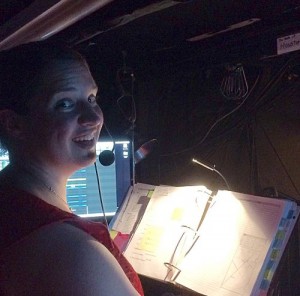Theatre workers have individual milestones: completing a degree, landing that first union gig, founding a company with a dream team of collaborators (and later leaving or dissolving that company), hirings and departures from shows or staffs that alter the course of their personal careers. But the U.S. theatre field as a whole very seldom shares collective milestones—potentially game-changing moments that feel like a hinge of theatrical history. The start of the Federal Theater Project of the 1930s was one, certainly; the Tax Reform Act of 1969, which created the 501(c)(3) nonprofit status, and thereby helped consolidate the emerging regional theatre movement, was obviously another. In the realm of industry-wide wake-up calls, there was August Wilson’s “The Ground on Which I Stand” speech, delivered at a TCG conference in 1996, and last year’s We See You White American Theater demands.
Inarguably one of the biggest pivots in U.S. theatre history was the official recognition of Actors’ Equity Association in 1919 (originally founded in 1913), which went a long way toward professionalizing a cutthroat business and setting standards for workplaces on Broadway, and later Off-Broadway and nationwide. Through the decades AEA has weathered many storms, controversies, and challenges, but arguably none so great as last year’s pandemic, which has touched the work of everyone in every field, but live performance workers acutely so. Not long after the total shutdown of in-person theatre came nationwide protests against anti-Blackness and racial exclusion more broadly, which focused the attention of many (if not all) in the theatre field on their own historic inequities and exclusions.
This renewed attention to the industry’s systemic biases and barriers to access is the reason that last week AEA announced a historic step with the potential to reorder the theatre business as we know it: Under its new Open Access policy, any actor or stage manager can join the union with proof of employment (pay stub, 1099) on any stage, Equity or non-. This radically simplifies a once labyrinthine process that required actors and stage managers to jump through successive hoops as “candidates” for union membership in certain approved non-union contracts, ultimately putting them in that old Catch-22: To get into the union, they needed a union gig, and to get a union gig, it sure helped to be in the union.

The new policy, as many of its advocates point out, puts the choice to join the union squarely in the hands of individual workers, “removing the ability for employers to pick and choose who deserves fair protections under a union contract,” wrote Bear Bellinger (he/him), a Chicago actor and AEA Central Principal Councilor, in a piece on the union’s website. “Equity members have historically seen membership as a privilege to be earned,” he continued, but pointed out “how much luck and nepotism can play a large role in our ability to land jobs in our field.” Combined with an honest look at employment trends that continue to disproportionately favor white theatre workers, the conclusion of advocates is clear. As Bellinger put it, “How do we diversify our union if marginalized people do not have access to join? Looking at our employers’ hiring statistics, how do we create a more diverse union when our employers disproportionately offer contracts to white men? What are the barriers we are imposing upon ourselves?”

Sid Solomon (he/him), a New York-based actor and former Equity vice president, put it this way: “The publicly available statistics clearly show us that there is systemic hiring bias in our industry. We know BIPOC and people with disabilities (among many other demographics) have been significantly less likely to be hired than their white and non-disabled peers. If we know that this hiring bias exists, it only makes sense to begin the process of untethering the union’s membership criteria from those biased practices.”
Of course, the hard-won protections that accrue to union membership don’t apply except under union contracts. And the ability to create and fill union jobs remains in the hands of producers. So don’t they still hold all the cards? For one, advocates believe that ending the union’s role as an industry gatekeeper is the right thing to do, and long overdue. Many also say a larger, more energized, more activist union will pay dividends over the long haul in organizing strength and leverage. Others we spoke to say this policy won’t change much in the way they do business, or significantly tip the balance of pros and cons to joining the union—at least not right away. (Some have wondered whether a fresh glut of under-employed union members will create more pressure for exceptions and carve-outs, as in the U.K., where it is similarly easy to join the union but actors are also free to move between union and non-union gigs.)
So what will this new policy actually mean for the field and its workers as rehearsal rooms and theatres begin to reopen? Obviously only time will tell for sure. But we asked several industry sources and union folks to give us their best guesses and hopes about how this momentous change will play out.
Open Call Access
No one we spoke to for this story could think of an instance where lack of a union card was a barrier to a performer landing a union job they were being considered for. But being considered for jobs in the first place is another matter, and it’s in widening the talent pool beyond the usual suspects where Open Access has the most immediate potential to alter the landscape. One of the chief benefits of Equity membership, after all, is that the union has negotiated mandatory auditions for principals and chorus members into its contracts, which means that everyone from Broadway producers to resident theatres must see all AEA members who show up on certain appointed days.

Of course, opening membership to all comers could conceivably make these open calls—Equity Principal Auditions (EPAs) and, for musicals, Equity Chorus Calls (ECCs)—into multi-day marathon sessions. Some casting directors we spoke to felt a bit blindsided by the policy announcement. Stephanie Klapper (she/her), a New York-based casting director at the head of Klapper Casting and a member of the Casting Society of America’s (CSA) board of directors, said she was “disappointed” there hadn’t been “dialogue so we could all be better prepared for an announcement like this.”
Rachel Hoffman (she/her), a casting director with Telsey + Company, said that as an advocate for actors, her initial reaction to the news was, “This is great. It’s access for more people and protection for a larger group of people.” She acknowledged that many of her peers’ initial reaction was, “Wow, this is going to make EPAs and chorus calls a lot busier. I don’t know if that’s a bad thing. My job is to find the best people, and to know as many people as I can.” She thought of the auditions Telsey + Co. have held for the summer seasons at the MUNY in St. Louis, where “you see lines out the door when they do their EPAs.”
She wonders, though, whether the past year of virtual auditioning, necessitated by pandemic social distancing, might offer alternatives to long, crowded waits. “I’m not sure the solution is to add three more EPAs for every Broadway show,” she said. “I’ve met so many people throughout the last 16 months I wouldn’t have otherwise because of video submissions. So could there be some kind of hybrid solution, based on what we’ve learned in the last 16 months?”

Caroline Liem (she/her), CSA’s board’s vice president, echoed the concerns about potential volume but also shared the sentiment that “it’s our job as casting directors to really know who’s out there and to bring up the next wave.” She and Hoffman both expressed hope that producers would consult casting professionals in any deal they make to expand or change the EPA process.
For her part, AEA president Kate Shindle (she/her) joked about the concern that the new policy would lead to open calls with “a line that goes from Ripley-Grier,” a rehearsal studio in midtown Manhatttan, “all the way up to 96th Street. I don’t know that that’s a given. But if we have a huge influx of new members, the cure will be trying to do something we always do anyway, which is to negotiate more required auditions. And if employers want to participate fully in making sure that more people get access, they could add another day and we would certainly not stop them; we’d be really excited about that.”
As actor and delegate Jessica Wu (she/her) said, “To open up access to, especially, these communities who have been historically excluded from our industry through systemic racism, opening up that one pathway to be able to be seen, is a big step. It does not do anything to make more jobs, specifically for BIPOC artists. But it opens the door.”
Organize for Size
Beyond Broadway, Off-Broadway, and regional theatres, which are almost uniformly on Equity contracts (though not without the occasional push), there remain some big non-union fish that AEA would like reel in. One is the series of Broadway hits that launch tours with non-Equity companies but still use the “Broadway” brand name (Equity’s campaign aimed at discerning consumers, “Ask If It’s Equity,” is due for a reboot and maybe a rethink). This is one pressure point we wondered about: Might a preponderance of new Equity members make it harder to find talent for these non-union tours, thereby putting pressure on producers to sign with the union?
Said Sid Solomon, “Potentially, yes. While I don’t think anyone believes that opening access to the union will lead to the evaporation of the non-union talent pool, it certainly has the potential to put a dent in it. And if Equity can continue to demonstrate that being a member has significant value, then we can hope that many of the stage managers and actors who might have been populating non-union commercial touring productions will choose to join the union.”

Rachel Hoffman, who doesn’t cast non-union tours herself but has colleagues who do, was less sure. “I’m guessing it won’t be that much more difficult to find actors,” she said. “There may still be enough savvy young actors who will ask the right questions, and think, ‘I’m not going to put myself in the union pool just yet.'” She mentioned a recent episode of the podcast Guys Who Like Musicals, in which Broadway actors Dan Tracy and Joe Carroll broached this and several other topics, including Tracy’s formative work on a non-union tour of American Idiot, and counseled listeners to take a cautious approach. As Carroll put it, “I would wait and see what happens with tours. If everybody just jumps in right now, you could be one of the best non-union people that’s chilling, and you may have a great opportunity to take out the second or third national tour of something.”
AEA’s Shindle reiterated that while organizing muscle wasn’t the chief aim of the new policy, “Anything that can help us get more contracts and more protections for actors and stage managers in live theatre is a good thing. If it helps with organizing, fantastic; if it helps us to be able to achieve more contracts on the road or anywhere else, that’s icing.”
Speaking more broadly about organizing goals, Amanda Spooner (she/her), a stage manager and Equity council member, believes that Open Access will “motivate membership to say, ‘We need more contracts.’ And that is what the labor union should be doing…Does it mean that they can afford Equity Health Fund payments next week if they’re a non-Equity producer? No, but it gives us a shared goal, and I’m excited about that.”
Small Theatre Scenes

Another active area of theatre work whose future could be impacted by Open Access are the nation’s many storefront theatres. But many of them were already blazing their own paths away from penury. Indeed, moving from being one of Chicago’s Off-Loop non-Equity companies to an Equity house had been a goal of Raven Theatre’s Cody Estle since he became artistic director in 2017. Their first show as an Equity theatre was supposed to be during the since-canceled 2020-21 season. The move to union status required much careful planning, explained managing director Markie Gray (she/her), including shoring up resources and funding and getting their board of directors on board with an increased operating budget.
“It’s a pretty significant leap for a theatre of our size,” said Gray of her company, which listed expenses totaling under $1 million on their 990 tax forms each of the last two seasons leading into the pandemic.
Before the theatre’s shift, it had been one among many in the city that operated with both Equity members and non-Equity actors in their show. As Gray pointed out, LORT contracts and Chicago Area Theatre (CAT) contracts for Equity theatres allow for certain ratios of union to non-union performers, stipulations that remain in place thus far with new Open Access policy. That’s why Gray doesn’t expect this news will affect the vibrancy of the pool of non-Equity actors in the Chicago scene, nor necessarily the way mid-tier and storefront theatres will operate moving forward.
“I worked at an Equity theatre for several years and saw many actors, many non-Equity actors, who had been working for years and definitely could have joined the union and elected not to,” said Gray, whose background includes stints at Yale Repertory Theatre, Berkeley Repertory Theatre, American Theater Company, and First Floor Theater in various roles. “It’s an individual choice for every actor and artist whether or not that is a move that they want to make. I think it’s fantastic that barriers have been taken down for them to be able to do that; it makes that choice a little easier for them. There may be fewer non-Equity actors and more Equity actors, maybe. But I’m not anticipating some seismic shift.”

Gray’s sentiments were echoed by Ilesa Duncan (she/her) and Kaiser Ahmed (he/him), artistic directors of Chicago’s Lifeline Theatre and Jackalope Theatre respectively, and Ron Sossi (he/him), artistic director of Odyssey Theatre Ensemble in Los Angeles. All agreed that while there will likely be an initial influx of new members joining around the country, they don’t expect this policy to change their particular theatre scenes all that much. Duncan and Ahmed indicated their gratitude for the removal of at least one layer of gatekeeping, putting the choice of whether to be union or non-union in the hands of the city’s actors and stage managers. For his part, Sossi issued a caution for workers to do their research before making a decision.
“It is a wonderful opportunity for BIPOC actors,” said Duncan in an email. “The storefronts and mid-tier non-Equity theatres are already in the process of incorporating pay equity, and many like us may consider becoming Equity houses. All change will take time and, in this case, that change will require non-Equity theatres to rethink/innovate how they will meet the change.”
For his part, Ahmed hopes to see a big effect on the industry as a whole, even if the changes won’t be as significant in scenes like L.A.’s or Chicago’s. Indeed, he said there’s a chance that this could result in an even more vibrant non-union scene in some cities, especially if the definition of “professional” isn’t determined solely by an Equity card.

“That change won’t just come from Actors’ Equity removing their barriers of entry,” added Ahmed in an email. “It will come from the union working closely with the theatres they now consider ‘professional’ to create opportunities for AEA talent. It will come from brave funders who are willing to invest in a growing Chicago theatre scene, and not just an established one. It will come from all theatre becoming truly more equitable to their artists, whether the industry labels it their career or their hobby. Everyone’s gotta meet the moment.”
In L.A., where the Odyssey operates, Equity had a bruising battle with 99-seat theatres a few years back over a long-standing plan that allowed members to work without a full contract and only minimal pay and protections; the upshot was that some small theatres went onto Equity contracts, some ensemble-run theatres were allowed to continue business unchanged, and others went fully non-union. Shindle, who came into her presidency in the midst of that conflict, said that while she understands the plight of small theatres who “weren’t lying” about their inability to pay Equity rates, she has aligned the union behind a promising legislative effort to increase arts funding in the state with the hopes that that tide can lift all boats. “The answer is more funding for live arts in California, which for whatever reason has lagged so far behind,” she said. “I’m optimistic and excited about that.”
Managing the Confusion

Though it has “actors” in its name, don’t forget about the stage managers, who are also repped by the union. To Amanda Spooner, the Open Access policy feels like a continuation of the work she began in 2020 under the name the Year of the Stage Manager, in an effort to increase the visibility and understanding of the role of stage managers. For this often overlooked area of the field, Spooner sees Open Access as a chance for more stage managers to have the support and backing of a union in their push for equitable wages and benefits in the industry.
“It’s about stage managers being able to be the laborers they want to be and to stand in solidarity with other laborers,” said Spooner. She did offer a caveat: “A lot of people that I’ve talked to said, ‘Oh, now all these people are going to rush to join the union.’ That’s not true. It’s just not true. There are people who are still going to wait until they think it’s the right time for them.”
Giving stage managers agency over their choice to join the union, though, may alleviate one problem Spooner has flagged. Some stage managers, she explained, have been fed misleading information from industry gatekeepers and employers about whether or not union membership is a prerequisite for certain union stage management contracts. (It’s not.) At the very least, Open Access may begin to banish the mindset that a union card equals a certain level or expertise or experience, and may give stage managers another tool to combat misinformation they may come across in an industry still grappling with a full understanding of their role.
Spooner said she thinks a policy move like this was bound to happen eventually, but the pandemic gave everyone the time to slow down a bit and take stock of what works, what doesn’t, and what steps the union can begin to take to rectify previous issues.
“At the end of the day, it’s a commitment,” concluded Spooner, again emphasizing the individual nature of the decision as well as noting the strength that comes with solidarity. “I think what Equity is saying with the Open Access program is, we’re identifying what is in our power to change. Is it going to fix all of the issues in the industry? No, but we have a responsibility in our labor union to do better when we know better, and to fix what we have the power to fix, and we’re going to learn from it.”
The International Angle

One important aspect of the new policy we haven’t seen covered in detail is a change spearheaded by actor and delegate Jessica Wu, along with Central Principle Councilor Bear Bellinger: to remove immigration or citizenship status from the consideration of eligibility. A Canadian citizen who was fortunate to be able to join the union right out of college via a limited post-graduate visa, Wu nevertheless watched in years since as other actors without green cards or citizenship pushed against the union’s limitations regarding “non-resident members” and “non-resident alien members—a term that is not so great.”
The former Equity policy, she explained, “limited the rights to join, and your rights if you happened to be able to join, if you did not have a green card or were not a citizen.” These rules, she reasoned, were put in place to protect American performers from the perceived threat of a British invasion—the notion “that producers will always want to bring in that British star, so we need to protect the rights of our American members to those jobs.” But the people this policy ended up affecting the most, she said, “were actually a lot of people like myself, who came from foreign countries as 18-year-olds for university programs, and who entered the workforce, mostly on work visas, and came up against these barriers of the union and were limited in the jobs, opportunities, and benefits of membership.”
This policy continued for so long, she said, because “nobody saw or understood how it truly impacted this entirely different population and community of international artists; all people could see was, you know, some BBC or West End star coming to do a Broadway show. They didn’t see the 21-year-old chorus member wanting to do a regional job in Texas.”
That’s why, as soon as she became an Equity delegate in 2019 (the same year, incidentally, she finally got her green card, 15 years after first applying), she took up changing this policy as her main cause, and she is proud to note that it was among the first aspects of Open Access to get a “yea” vote. True access, after all, knows no borders.
To Join or Not to Join
Threaded through all our reporting has been the question: Does this policy merely take down the gates or open the floodgates? Will everyone who feels like joining Actors’ Equity simply plunk down their $1,700 initiation fee (payable over three years) as soon as they can raise it? Off the record, one casting professional expressed the concern that, rather than diversifying the ranks, this new policy could mean “a lot more white people are going to join the union—kids coming out of college whose parents can afford the initiation fee.”
Addressing the fears of a glut, Solomon said, “I don’t think there’s anyone alive that can remember a time when the theatre industry wasn’t oversaturated with actors (and to a lesser extent stage managers), with far more people wanting to work than there was work to give them…Allowing more people to join the union shouldn’t in any way fundamentally shift that imbalance. There will still be more workers than work. It’s also important to remember that it won’t even change the available talent pool for Equity bargaining partners, because they’ve always been allowed to give Equity contracts to both members and non-members as they see fit (which is how most of us end up joining the union in the first place). What opening access to the union changes is that Equity’s bargaining partners will no longer be solely responsible for deciding who’s ‘worthy’ of union membership, and membership in the union won’t be so closely tied to systemic hiring bias. In my opinion, those are both very good things.”

Shindle—who said the union had no projections of how many new members might join, but had heard that already 250 people had filed applications for membership in the time since Open Access was announced—didn’t think that lifting the eligibility barrier would alter the individual calculus each performer or stage manager must do.
“I went through this, and so did just about everybody I know,” said Shindle. “To become an Equity member is a pretty personal decision. There are a lot of factors: where you live, where you’re planning to work, where you are in your career, how many credits you have. Almost all of us did non-union theatre before we did union theatre, and that process probably won’t change very much.”
Wu concurred. “I think that the the timing and the choice to join is different for every single person, for every single artist’s circumstances. That will never change. The amazing thing about opening access is that you get to make that choice when it’s right for you; you’re not relying on the happenstance or the luck of a contract or a producer granting you that right.”
Jerald Raymond (he/him) is associate editor of American Theatre. jpierce@tcg.org. Rob Weinert-Kendt (he/him) is editor-in-chief of American Theatre. rwkendt@tcg.org
"open" - Google News
July 29, 2021 at 07:50PM
https://ift.tt/3rLqMyz
AMERICAN THEATRE | Actors' Equity Blows Open the Doors - American Theatre
"open" - Google News
https://ift.tt/3bYShMr
https://ift.tt/3d2SYUY
Bagikan Berita Ini














0 Response to "AMERICAN THEATRE | Actors' Equity Blows Open the Doors - American Theatre"
Post a Comment